Cats find an opportunity to play in some of the unlikeliest places and with the unlikeliest things.
That includes bugs. While cats will not necessarily keep bugs away from your home, indoor-only ones will try to get their paws on every little critter just to have a bit of fun.
However, this rule does not apply to all cats or all insects.
Some might have no interest whatsoever in cockroaches or spiders, but might go crazy for running around chasing a moth or a fly.
Contents
Do Cats Kill House Bugs?
Many cats will want to play with house bugs just out of pure enjoyment. And before you think that this might be cruel, you have to consider how cats behave in the wild.
They are natural-born hunters, so playing with bugs automatically stimulates their instincts.
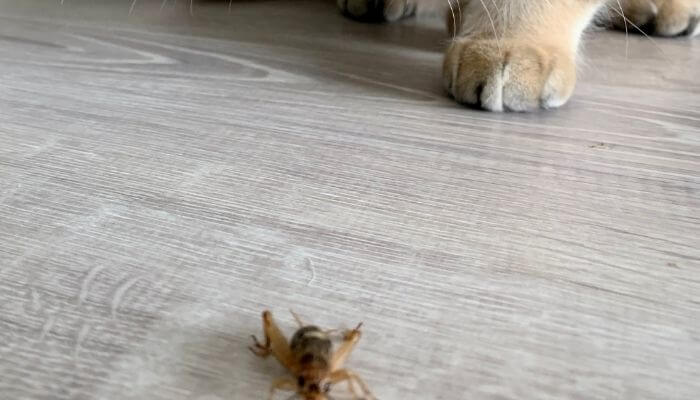
Does that also guarantee that a cat will kill your house bugs, especially if you have a lot of them? The answer is no.
If a single bug enters your home, your cat might show an interest in it, especially if it’s a new insect that she has never laid her eyes on before.
However, if you have a real house bug infestation and there are dozens of these insects roaming through your kitchen or bathroom, even at night, your cat is not going to be able to kill all of them.
Do Cats Eat Bugs?
Sometimes, cats do eat bugs.
But they don’t necessarily start with this purpose in mind.
Otherwise said, unlike humans, they do not consider the amount of protein in insects, so they don’t see them as a main food source or even a delicious snack.
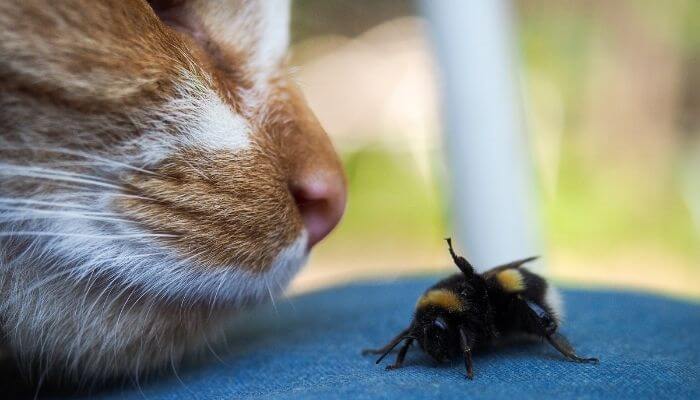
However, they will look at bugs as tiny prey, which means that they will be instinctively attracted to their movements.
Eventually, a cat might try to eat the bug simply as part of the hunting ritual.
In the outdoors, cats sometimes hunt down and eat mice, which can also put them at a risk health-wise, so they’ll behave with bugs much like they tend to do with tiny rodents.
Do Cats Keep Cockroaches Away?
No.
Cats aren’t capable of keeping cockroaches away because these insects rarely take notice of the beings in the environment they’re raiding.
You’re likely to notice that you have a cockroach infestation in your home during the night.
When you turn on the light in the bathroom or kitchen, there could be one or several cockroaches running away under your furniture or through the vents.
But cockroaches are scared of light and direct touches, not the presence of a cat in your home.
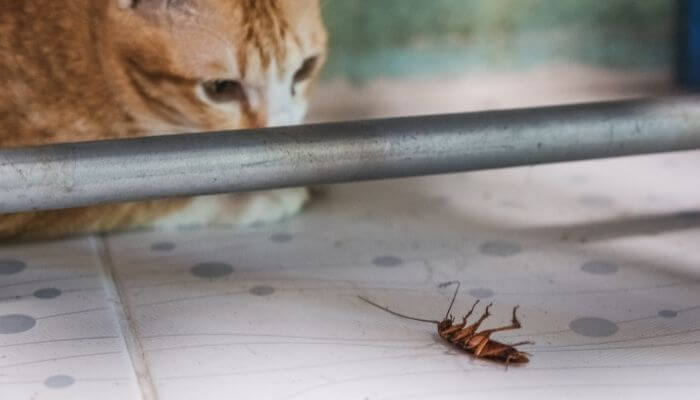
Some cats might hunt down cockroaches, especially if they really have no other entertainment opportunities.
But not all cats are the same, which is why to some, they might be interesting, but to other pets, these insects might be nothing at all.
What’s worse, your cat’s food bowl could attract cockroaches, especially when she isn’t looking.
This means that you might inadvertently be feeding your cockroach infestation just by leaving your cat some food throughout the night.
Do Cats Keep Spiders Away?
The answer to this question actually depends on several different factors, such as the type of spider you might have in or around your home or the area it is located in.
For example, if you have one of those thin, small, and otherwise harmless spiders in an upper corner of your room simply because you haven’t dusted or cleaned it in a while, your cat is not only not going to be able to reach it, but she might not even know it exists.
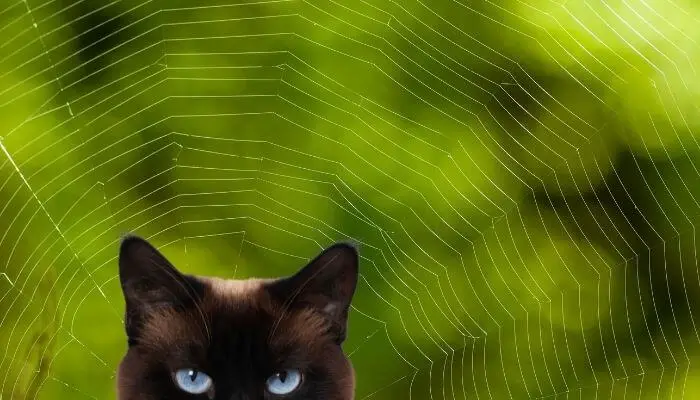
On the other hand, if you live in Australia where bugs tend to be bigger than in Europe, and there’s a giant spider going into your house, your cat will likely notice it and try to attack it.
This could also be dangerous for the animal, since some of these critters can be deadly, such as the Sydney funnel-web spider, the Redback spider, or the recluse spider.
Cats are also more likely to attack spiders outdoors.
So, if you have a garden and you regularly leave your pet in it, chances are that a ‘fight’ between a larger spider and your cat is going to happen at one point — but this also means that she’ll prevent it from entering your house.
Do Spiders Avoid Cats?
Not necessarily.
If the question refers to whether or not the actual presence of a cat in your home is going to deter spiders from entering it, the answer is a clear no.
Spiders don’t mind the presence of cats unless they are being attacked by them.
Some might retract and run away, which could, in turn, make the cat even more interested in them.
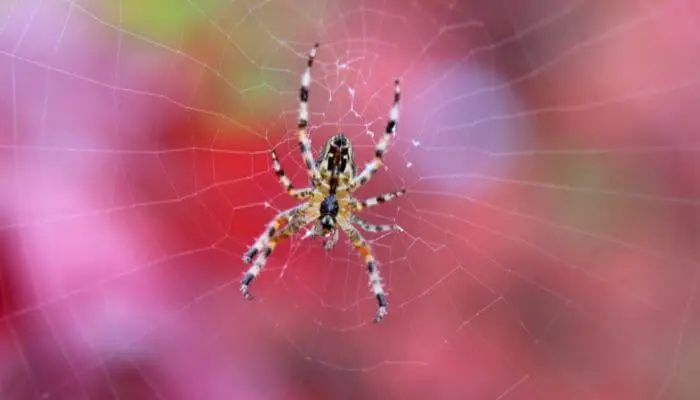
In most cases, even when cats end up eating venomous spiders, they might still not be dangerous to them — unless they bite them in the mouth before being swallowed.
Can Cats Sense Spiders?
It depends on their size and their location.
As you probably know, cats can see much better than humans, and if the spider is located at ground level, they will probably notice it before you do.
The other sense they use when discovering prey is their hearing. Even here, they surpass our abilities.
But if the spider is extremely small and rarely moves throughout the day and has built a web right next to your ceiling, the likelihood of your cat realising it’s there is slim.
On the other hand, a larger spider, although generally inconspicuous, will attract the attention of a cat if it’s moving on the floor.
Are Bugs Attracted to Cats?
It depends on the type of bugs.

Cockroaches, spiders, and any other types of house bugs you might be extremely bothered by will show no specific interest in your cat.
However, bugs like fleas, ticks, and mites will want to become ‘close friends’ of your cat.
Outdoor cats or those that share their time between living indoors and outdoors have a much higher chance of catching these external parasites.
And if you did not know, in some cases, they can do a lot of harm to pets.
Kittens, for example, can develop severe anemia if they have a large flea infestation and nothing is done about it.
Even though cats can get fewer diseases from ticks compared to their canine counterparts, one of these conditions can be life-threatening or can cause lifelong modifications — Lyme disease.
Since you can’t know if a tick is a carrier for the Lyme disease pathogen, you can’t know if your cat is going to get it or not.
Keeping your cat indoors can protect her from these parasites, but so can using a flea and tick spot-on solution every month or so (especially if your cat also goes outside).
A Note on Insecticides, Bugs, and Pets
These days, there are many pet-safe bug killers available for sale, but the truth is that since many of them are made with natural substances, they rarely ever get the job of decimating the bug population done.
This leaves pet owners with no other option than to choose an alternative that’s not pet-safe.
Some things can still be done in that you can use the insecticide in a room and close it for a couple of days so that your cat doesn’t get exposed to the substance.
However, there is a risk that also needs to be considered and it’s that cats can still be exposed to the substance by eating a cockroach, for example.
Cats don’t usually show any interest in bugs that have already died.
But if you’re not careful and you spray the insecticide, the bugs are still alive, and your cat tries to eat one, she will accidentally ingest the bug killer, too.
These substances are very dangerous and can sometimes be lethal for pets, so if this happens, take your cat to the vet immediately.







Leave a Comment